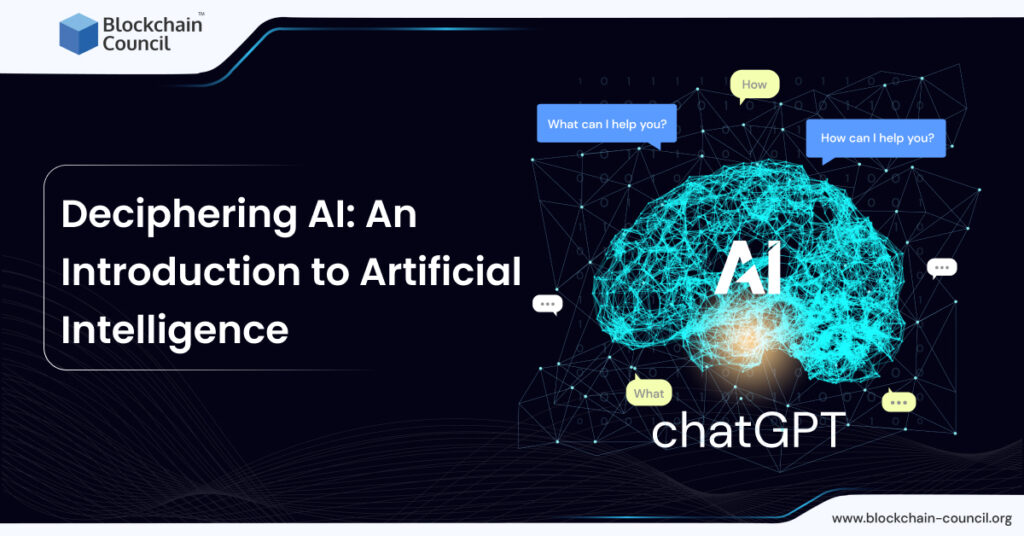
Introduction
The term Artificial Intelligence (AI) has attained near-ubiquitous status in the contemporary technologically advanced society. AI significantly reshapes various aspects of human existence, including personalized recommendations on streaming platforms, self-driving vehicles, and virtual assistants such as Alexa and Siri. However, what is AI, and how does it function? This article will discuss the fundamentals of artificial intelligence, its many applications, and the competencies required to become an AI developer.
AI, at its essence, pertains to the replication of human intelligence through programming machines to think and behave in a human-like manner. This encompasses language comprehension, reasoning, problem-solving, perception, and learning. Artificial intelligence algorithms process enormous volumes of data, detect patterns, and arrive at decisions with minimal human involvement.
Forms of AI
The two broad classifications of artificial intelligence are Narrow AI and General AI. Narrow AI, alternatively called Weak AI, is purpose-built to execute particularized duties, including image classification or speech recognition. General AI, conversely, pertains to machines possessing intelligence akin to that of humans and capable of performing any intellectual endeavor that a human can execute. Diverse industries are implementing AI to automate operations, increase productivity, and improve decision-making. AI is utilized in the healthcare industry to identify diseases and develop individualized treatment programs. Finance employs AI for fraud detection and risk management. AI is implemented in autonomous vehicles for navigation and collision avoidance.
How AI Operates
Data and algorithms are what enable AI systems to learn and make decisions. A subset of AI, Machine Learning (ML) is the most frequently employed methodology in developing AI applications. ML algorithms make decisions or predictions based on labeled data without being explicitly programmed. In addition to conventional machine learning methods, AI developers investigate sophisticated techniques to augment AI’s capabilities. One such method is Generative AI, which generates new content through neural networks. For instance, Generative Adversarial Networks (GANs) can generate realistic images, music, and text. This technology finds utility in various creative domains, including but not limited to art, music composition, and marketing content generation.
3.1 NLP (Natural Language Processing)
Additionally, natural language processing is an area of AI developing swiftly. NLP aims to empower machines to interpret, generate, and comprehend human language. Chatbots, language translation services, and voice assistants are all powered by this technology. As the number of voice-activated devices increases, the significance of natural language processing (NLP) in enhancing user interactions with technology grows.
Constraint-Based Learning
An AI agent learns to make decisions through reinforcement learning through interaction with the environment. It gradually gains knowledge of the most effective strategy by assigning rewards or penalties to the agent by its actions. This methodology has been effectively implemented in gaming, robotics, and autonomous vehicle navigation.
Comprehensible AI
Focusing on making AI models more transparent and understandable, interpretable AI is an expanding field of study. This holds especially true in sectors as critical as finance and healthcare, where the repercussions of AI system decisions can be substantial. Methods such as feature distillation and feature visualization are currently under development to improve the interpretability of AI models. This will empower users to comprehend the reasoning and process behind a specific decision.
Artificial Intelligence in Healthcare
AI is transforming patient care, diagnosis, and treatment within the healthcare industry. Medical image analysis powered by AI can identify diseases, forecast patient outcomes, and customize treatment strategies. Additionally, administrative processes, including invoicing and scheduling, are being enhanced with AI, resulting in more effective healthcare delivery.
AI in the Financial Sector
Among the numerous applications of AI in the financial sector are algorithmic trading, risk assessment, and fraud detection. By identifying patterns and anomalies in enormous quantities of economic data, AI algorithms enable financial institutions to make more informed decisions. Furthermore, chatbots and virtual assistants powered by artificial intelligence are being implemented to augment customer service and elevate the banking experience.
The Function of AI Programmers
AI developers are instrumental in developing innovative solutions to complex problems and advancing the AI field. Their responsibilities include developing, implementing, and optimizing AI models and algorithms. Developers of AI must remain abreast of the most recent AI developments and continually hone their abilities to satisfy the rising demand for AI-powered applications.
Ethical Determinations
As AI becomes more ubiquitous, ethical concerns become increasingly vital. Privacy concerns, bias in AI algorithms, and the effects of AI on employment must be addressed. AI researchers and developers are responsible for prioritizing ethical conduct and guaranteeing AI technologies’ responsible development and deployment.
Competencies Required to Become an AI Developer
Completing a rigorous programming, computer science, and mathematics curriculum is essential for becoming an AI developer. It is imperative to possess expertise in programming languages such as Python and R and understand ML libraries like TensorFlow and PyTorch. Artificial intelligence developers must also know neural networks, deep learning, and natural language processing.
Training and Certification in AI
Individuals interested in pursuing a profession in AI may enroll in artificial intelligence certification programs. These programs include AI ethics, ML, and deep learning, among other subjects. The Prompt Engineer Certification, which provides prompt engineering courses, is one such program. These courses equip students with practical knowledge of AI techniques and tools in preparation for careers as AI developers.
The Prospects for AI
With the continuous advancement of AI, its societal impact is anticipated to increase. The significance of ethical considerations, including the potential for bias in AI algorithms and job displacement resulting from automation, is steadily growing. It is imperative to confront these challenges to guarantee that AI contributes positively to society.
Conclusion
AI is a discipline in rapid development that can revolutionize industries and enhance the quality of life. Gaining a fundamental comprehension of artificial intelligence and acquiring the requisite proficiencies can grant access to promising professional prospects in this ever-evolving domain. Investigating artificial intelligence can be a gratifying endeavor, regardless of one’s level of interest in developing AI applications or the underlying technologies that drive them.